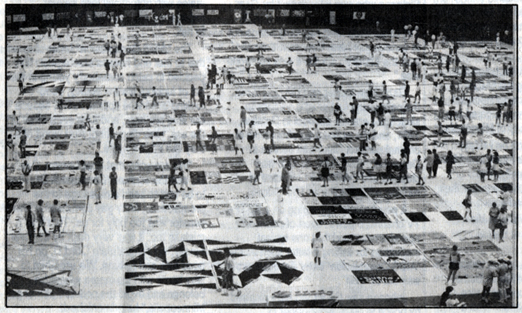Difference between revisions of "Hubert H. Humphrey Metrodome"
(New page: Image:Quiltdome.jpg ---- This page is still under construction. -SVC. Part of Minneapolis/St. Paul, MN: 100 Queer Places in Minnesota History, (1860-1969), (1969-2010)) |
|||
| Line 1: | Line 1: | ||
| + | <div style="text-align: center;"> | ||
| + | 900 South Fifth Street, Minneapolis, MN (1982-2010) | ||
| + | </div> | ||
| + | |||
| + | |||
| + | |||
| + | Once Minneapolis’ main facility for sporting events, the Hubert H. Humphrey Metrodome sits at the eastern edge of downtown Minneapolis. This former industrial neighborhood is a likely site of lesbian historical interest—part of the “Printing District,” it provided one of few career options for independent women who lived near Powderhorn Park and other nearby neighborhoods. | ||
| + | |||
| + | |||
| + | Municipal officials funded construction of the “Dome” as a response to the decline of the neighborhood’s industries. At a cost of $55 million in 1982 (roughly 120 million in 2009 dollars), the venue consumed more than 6 city blocks and made use of an economical fiberglass technology for its trademark domed roof. It remains one of the most inexpensive major-league sporting venues in the United States. | ||
| + | |||
| + | |||
| + | <div style="text-align: center;"> | ||
[[Image:Quiltdome.jpg]] | [[Image:Quiltdome.jpg]] | ||
| + | </div> | ||
| + | <div style="text-align: center;"> | ||
| + | <small>'''The AIDs Quilt displayed in the Metrodome, photographer unknown. Courtesy of the [[Jean-Nickolaus Tretter Collection]].'''</small> | ||
| + | </div> | ||
| + | |||
| + | |||
| + | Few would suspect the Metrodome’s queer significance—major-league sports are incorrectly attributed to heterosexual male bonding—and this is understandable; the Dome’s designation as a queer space lasted for just two days in 1988. From July 15 to July 17 that year, the venue displayed a section of the AIDS Memorial Quilt—one of the most significant works of collaborative art in the 20th century. At the time of its unfurling in Minneapolis, the entire work weighed more than three tons and could cover four football fields. | ||
| + | |||
| + | |||
| + | The “Quilt” received substantial media attention in 1987, when organizers from the NAMES Project displayed it on the National Mall in Washington, D.C. Friends and family created each 3’ x 6’ panel, which memorialized a victim of Acquired Immunodeficiency Syndrome. The quilt attached mournful human faces to a pandemic that elicited widespread indifference—to some, the “Gay Disease” was far removed from everyday life. | ||
| + | |||
| + | |||
| + | More than 1,000 local volunteers helped to present the exhibit and take it down. One of the thousands of panels evoked the spirit of strength that HIV/AIDS-afflicted people continue to display. Jeff Buzzetti, of Minneapolis, is forever remembered for the letters on his quilt panel, which spell out his dying words: “It’s All About Love. Tell Everybody.” | ||
Revision as of 18:44, 13 March 2010
900 South Fifth Street, Minneapolis, MN (1982-2010)
Once Minneapolis’ main facility for sporting events, the Hubert H. Humphrey Metrodome sits at the eastern edge of downtown Minneapolis. This former industrial neighborhood is a likely site of lesbian historical interest—part of the “Printing District,” it provided one of few career options for independent women who lived near Powderhorn Park and other nearby neighborhoods.
Municipal officials funded construction of the “Dome” as a response to the decline of the neighborhood’s industries. At a cost of $55 million in 1982 (roughly 120 million in 2009 dollars), the venue consumed more than 6 city blocks and made use of an economical fiberglass technology for its trademark domed roof. It remains one of the most inexpensive major-league sporting venues in the United States.
The AIDs Quilt displayed in the Metrodome, photographer unknown. Courtesy of the Jean-Nickolaus Tretter Collection.
Few would suspect the Metrodome’s queer significance—major-league sports are incorrectly attributed to heterosexual male bonding—and this is understandable; the Dome’s designation as a queer space lasted for just two days in 1988. From July 15 to July 17 that year, the venue displayed a section of the AIDS Memorial Quilt—one of the most significant works of collaborative art in the 20th century. At the time of its unfurling in Minneapolis, the entire work weighed more than three tons and could cover four football fields.
The “Quilt” received substantial media attention in 1987, when organizers from the NAMES Project displayed it on the National Mall in Washington, D.C. Friends and family created each 3’ x 6’ panel, which memorialized a victim of Acquired Immunodeficiency Syndrome. The quilt attached mournful human faces to a pandemic that elicited widespread indifference—to some, the “Gay Disease” was far removed from everyday life.
More than 1,000 local volunteers helped to present the exhibit and take it down. One of the thousands of panels evoked the spirit of strength that HIV/AIDS-afflicted people continue to display. Jeff Buzzetti, of Minneapolis, is forever remembered for the letters on his quilt panel, which spell out his dying words: “It’s All About Love. Tell Everybody.”
This page is still under construction. -SVC.
Part of Minneapolis/St. Paul, MN: 100 Queer Places in Minnesota History, (1860-1969), (1969-2010)
